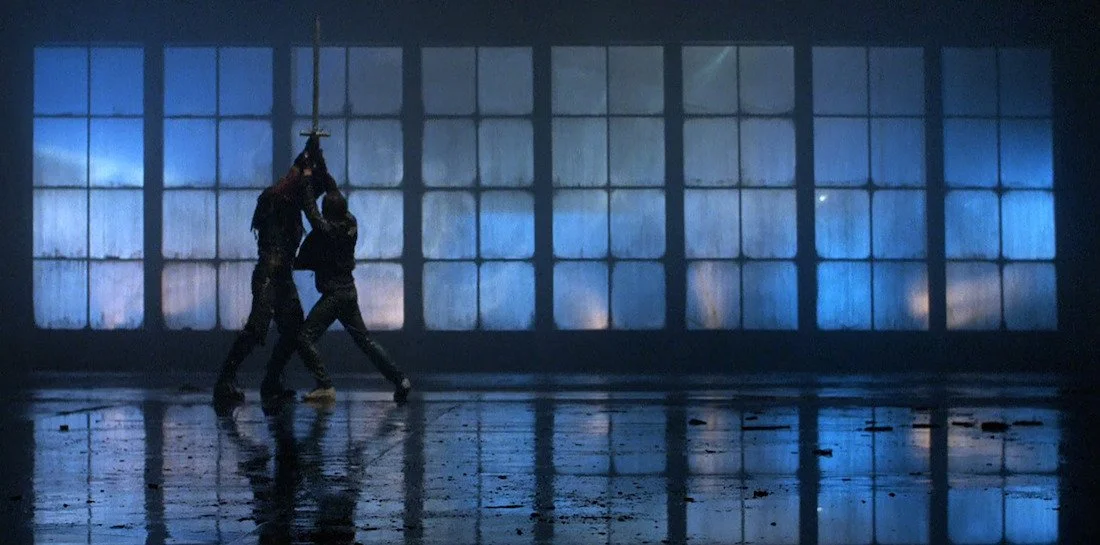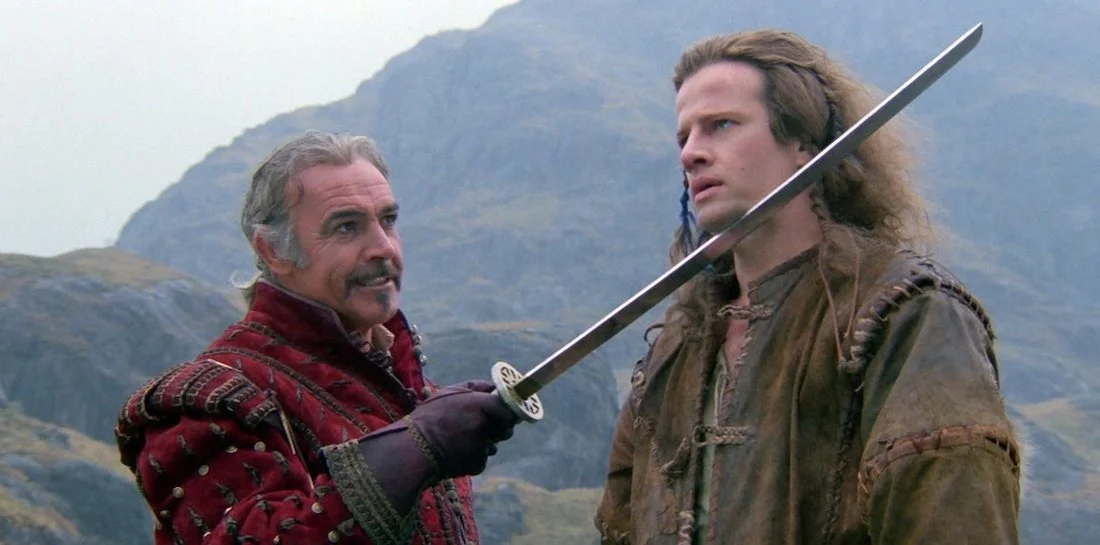HIGHLANDER (1986)
HIGHLANDER, the movie that started the franchise where in the end, there can be only one. I’ve had a lot of love for the film since the days of discovering the immortal song Princes of the Universe by Queen on a Newgrounds (remember them?) Flash animation. From that rabbit hole, I discovered the film itself on cable. It’s such an epically cheesy fantasy film and a shining example of how to do urban fantasy right.
The first in a series of five films follows an immortal 16th century swordsman from the Scottish Highlands (the name Highlander is actually not the name for an immortal in the franchise) named Connor MacLeod (Christopher Lambert) as he fights in a conflict with other immortals for a power known as The Prize in 1985 New York. In between following the events taking place in New York, flashbacks show the start of MacLeod’s hero’s journey in Scotland.
A side note about the film’s lore without giving too much away: the film’s approach to building intrigue about it without making the context too obvious until the inevitable exposition dump is admirable and well done.
HIGHLANDER’s main character trio is led by the absurdly underrated B-movie regular Christopher Lambert. He’s the kind of actor any other filmmaker probably would’ve reduced to being the villain for his signature imposing glare, but isn't because he always plays the hero role too well. His performance as McLeod generates emotional gravitas and cool stoicism.
In a move that was pretty common in the ‘70s and ‘80s (as seen in STAR WARS, HALLOWEEN, etc.), a popular veteran actor plays a key supporting role.
In this movie, it’s Sean Connery as Ramirez, MacLeod’s immortal mentor in the Obi-Wan Kenobi vein.The casting of Connery, showing his charm and natural, friendly chemistry with Lambert, was a stroke of genius.
Positioning him as HIGHLANDER’s mouthpiece to explain its lore through awesomely acted exposition was also a great idea.
Rounding out the main character trio is Mr. Krabs himself, reliable character actor Clancy Brown as The Kurgan, quite possibly the result of fusing Conan the Barbarian and Freddy Krueger in adjacent telepods. Brown is so enjoyably hammy and evil in the role, he dominates nearly every scene he’s in. His screen presence goes off the charts as the movie progresses.
It’s saying something about HIGHLANDER that Queen decided to not just do one song for the movie, but an entire soundtrack—and what a soundtrack it is! I admit I’m pretty biased since I love their music generally, although their work on HIGHLANDER absolutely surpasses what they did with FLASH GORDON. “Princes Of The Universe” is a perfectly bombastic song about the glory of being immortal in the movie’s universe, setting the mood immediately the minute the opening credits start. “Who Wants To Live Forever” is its tragic antithesis and where Michael Kamen’s score soars the highest. The song really elevates certain romantic scenes.
On the note of Michael Kamen’s score, it’s the definition of sweeping in scale. In a decade where orchestral scores were mostly overlooked in favor of synthesizers, Kamen’s orchestral pieces in this movie feel more fresh and unexpected. An official complete soundtrack has never been released (Queen’s album A Kind of Magic can be considered an unofficial soundtrack), but it's seriously overdue. The grander impact of Queen’s songs for HIGHLANDER can be witnessed in how big-budget films today like BLACK PANTHER incorporate many exclusively-written songs.
Of course, Queen’s music wouldn’t gel as well as it does in the movie without a former music video director being behind the camera. Director Russell Mulcahy, prior to directing films, had a background in directing music videos and it’s obvious when watching the movie. His music video for Bonnie Tyler’s “Total Eclipse of The Heart” is a clear spiritual predecessor, with blue lighting and an abundance of Dutch-angled shots. Mulcahy was clearly having the time of his life playing around with wild tracking shot movements and angles, sudden transitions and lots of blue lighting accented with smoke and fog as he directed HIGHLANDER.
If he just didn’t bring his high energy vibe, the movie wouldn’t be nearly as entertaining as it is. In my eyes, it's one of the best examples of a director using their music video background to its fullest visual potential. Mulcahy would later direct films like RESIDENT EVIL: EXTINCTION and THE SHADOW, but HIGHLANDER remains his most memorable work.
The movie had a budget of around $19 million, relatively low compared to other fantasy films at the time. It made the best of it by doing a lot of on-location shooting compared to shooting in a studio environment. The film’s shifting narrative structure wouldn't be as convincing as it is if they shot all of the Scotland scenes in a studio. The film’s usage of the Scotland setting really shows the power of on-set filming in showcasing the literal wideness of a film’s scope in light of their financial limitations. Even in the 1985 scenes, the New York-filmed establishing shots are adequately framed to emphasize the dark cityscape, in contrast to the 16th century scenes’ sunny Scotland mountains.
Infamously known as the franchise where there should be only one movie, HIGHLANDER is a far, far better film than the legacy of its sequels like HIGHLANDER II: THE QUICKENING. It works perfectly as a standalone feature and arguably didn’t even need continuations. If I were to recommend one part of the franchise to watch next, I’ve seen episodes of the ‘90s TV series adaptation and it’s decent (for ‘90s television).
I’m very optimistic about Lionsgate's long-in-development upcoming reboot based on Henry Cavill’s potential as the lead immortal and helmed by the awesome Chad Stahelski of JOHN WICK fame.
The sword fights in that reboot are going to be insane with stuntman-turned coordinator-turned director behind the camera.
Ultimately, among the distinguished pantheon of classic ‘80s fantasy films (CONAN THE BARBARIAN, THE PRINCESS BRIDE, etc.), HIGHLANDER continues being an immortal classic because of how it fully embraces what makes its lore so flat out cool.
Streaming on Amazon Prime and Tubi, HIGHLANDER gets one of the highest of my recommendations.






